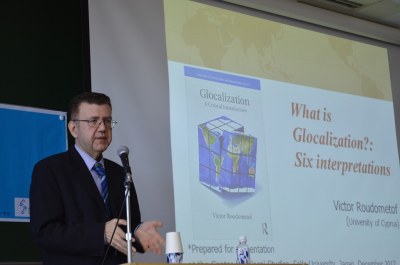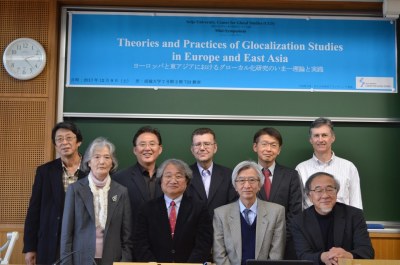

NEWS
2017.12.21
<Synopsis>
On Saturday, December 9, 2017, 13:00–17:00, Seijo University’s Center for Glocal Studies held an international mini-symposium, titled “Theories and Practices of Glocalization Studies in Europe and East Asia,” in Room 723, 2nd Floor, Building No. 7. The event was part of Seijo University’s project to “establish and promote a world-leading glocal-studies center that contributes toward a sustainable and inclusive society” (a MEXT-supported Research Branding Program for Private Universities).
<Report>
At the gathering, Victor N. Roudometof (University of Cyprus) delivered the keynote presentation, titled “What is Glocalization?: Six Interpretations.” In this presentation, Roudometof discussed how glocalization has been interpreted since the term was first introduced in the humanities and social sciences, back in the early 1990s. Six interpretations were discussed, including Roudometof’s own interpretation—that glocalization is a refraction of globalization.
The keynote presentation was followed by two presentations on glocalization case studies. The first presentation, titled “Glocal Culture and Social Empathy,” was delivered by Won-ho Jang (Director of the Center for Glocal Culture and Social Empathy, University of Seoul). Jang discussed the potential of popular (Korean) culture to generate social empathy across national borders.
The second presentation was by Tomiyuki Uesugi (Director of the Center for Glocal Studies, Seijo University). In this presentation, which was titled “Glocal Studies: Formulated and Practiced at the Center for Glocal Studies,” Uesugi discussed the potential of the Center for Glocal Studies to direct academic attention toward local actors, who are often ignored in the process of globalization, as well as the Center’s potential to rectify the asymmetry (or imbalance) between the Global and the Local.
Following these presentations, Ryuhei Hosoya (School of Global and Community Studies, Fukui University), Shinya Konaka (Director of the Center for Global Studies, Shizuoka University), and Kazuhisa Nishihara (Faculty of Social Innovation, Seijo University) commented on the theories and practices introduced in the presentations, drawing on their own perspectives.
The mini-symposium then concluded with a spirited general discussion with questions and answers on the fundamental issues. For example, the point was made that academicians can help clarify the significance and value of glocalization in our increasingly globalized societies and cultures, by formulating and developing disciplines that use the term “glocal/ization” (e.g., “glocalization studies” or “glocal studies”).
As the gathering concluded, the attendees agreed unanimously on the need for two actions. The first was for the Center for Glocal Studies to publish a report of the proceedings. The second was to hold, at a convenient time in 2018, an international symposium to exchange diverse ideas and perspectives on the theories and practices of glocal studies, particularly on the value and significance of the discipline.

